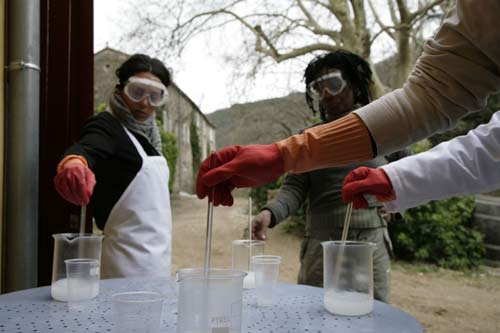The Independent's journalism is supported by our readers. When you purchase through links on our site, we may earn commission.
Pack your goggles and gloves, making beauty products is an ugly business
Ciar Byrne finds a tranquil retreat in southern France is just the place for a chemistry lesson

Your support helps us to tell the story
From reproductive rights to climate change to Big Tech, The Independent is on the ground when the story is developing. Whether it's investigating the financials of Elon Musk's pro-Trump PAC or producing our latest documentary, 'The A Word', which shines a light on the American women fighting for reproductive rights, we know how important it is to parse out the facts from the messaging.
At such a critical moment in US history, we need reporters on the ground. Your donation allows us to keep sending journalists to speak to both sides of the story.
The Independent is trusted by Americans across the entire political spectrum. And unlike many other quality news outlets, we choose not to lock Americans out of our reporting and analysis with paywalls. We believe quality journalism should be available to everyone, paid for by those who can afford it.
Your support makes all the difference.Pilgrims travelling from Rome to Santiago de Compostela would make a diversion to stay at the Domaine de Laval de Nize, in the Hérault region of France, by the Parc Naturel Régional de Haut-Languedoc.
The old house, now renamed Alabrena, after the old word for salamander in the local Occitan language, and converted into a small hotel, still has something of the sanctuary about it. Though today's visitors are holidaymakers interested in learning how to make organic beauty products.
Their tutor is Petre Sefton, the Domaine's English owner and a successful businesswoman in the UK before a severe attack of septicaemia led her to become interested in the healing power of plants. She insists that she was led to Laval de Nize by a dream. But it was a dream that took several years to realise thanks to a combination of French bureaucracy and the hostility of some neighbours who did not welcome the arrival of an Englishwoman with a plan to farm plants to make essential oils and tinctures.
The line of natural beauty products and remedies she now makes, Tortue Rouge – meaning red turtle, inspired by the American Indians, who described the earth as a turtle – is enjoying increasing popularity in the UK.
In keeping with the green philosophy of Tortue Rouge, I take the train from London to Montpellier – a pleasant eight-hour ride – followed by a journey by minibus up steep, winding roads. In spring and summer, this area of France is baking hot, and though I am visiting in unseasonably cold weather, grey skies cannot mask the beauty of this isolated spot.
At the hotel, a picture window in the open-plan communal area looks out over a swimming pool to a verdant scene of hills, woods and sky, which on my first morning is framed by an enormous rainbow.
After a satisfying breakfast, I join my fellow guests and get straight to work making soap – a process that resembles a chemistry lesson, requiring goggles, plastic gloves and an old apron. The trickiest bit is adding the lye to water, a procedure we perform in the open air so that the noxious fumes can blow away down the valley. Next comes the fun part: melting fats and oils in a saucepan, then adding the lye and whisking until reaching a thick consistency. Finally, it is time to choose from an array of essential oils and other natural additives – from clay to cocoa powder – to determine the fragrance, colour and texture.
The next day we learn how to make lip and hand balms, massage bars and oil. It is the first time I have given much thought to the products I use on my skin and the chemicals that are pumped in to them, yet it is so simple to make natural alternatives at home.
Petre also takes me to see where the plants used in her remedies are grown and dried. We drive up a steep, stony track, past woods brimming with flowers, to meet local growers Jean-Louis and Caro, who tend and pick plants then dry them out in a specially built séchoir. In this fragrant wooden hut, huge drawers contain rosemary, mint, olive leaves and more which once dry are processed.
Petre's unusual project has provided her with a new business about which she is clearly passionate. It has also ensured that the Domaine is still a place where travellers can come to heal their souls.
COMPACT FACTS
How to get there
Ciar Byrne travelled from London to Montpellier by train with Rail Europe (0844 848 4064; www.raileurope.co.uk), which offers return fares from £118. She stayed at Alabrena, Val de Nize, Lunas (00 33 4 67 97 05 68; www.tortuerouge.co.uk), which offers courses in making organic beauty products for £634 per person, which includes four nights' accommodation with meals.
Join our commenting forum
Join thought-provoking conversations, follow other Independent readers and see their replies
Comments